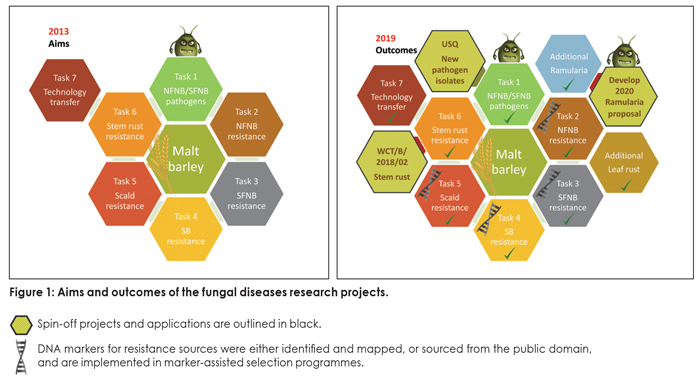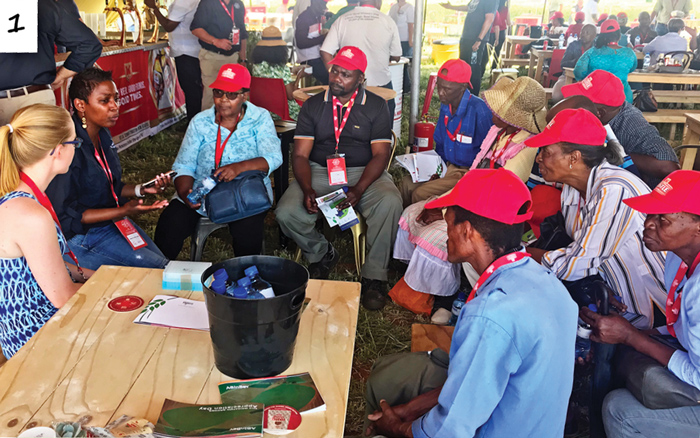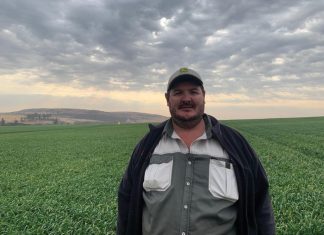
Kelly Breeds,
barley research lead, CenGen (Pty) Ltd
 Dr Renée Prins,
Dr Renée Prins,founder and director,
CenGen (Pty) Ltd and
associate extraordinary
professor: Department of
Genetics, Stellenbosch
University

Prof Anke Martin,
associate professor: Crop
and Fungal Genetics,
University of Southern
Queensland
In true South African fashion – of always striving to better oneself – South African Breweries (SAB) and Anheuser-Busch InBev (AB InBev) have set a goal for South Africa to become a net exporter of malt by 2021. To reach this target will require producing 475 000 tons of barley per year. Furthermore, challenges such as water scarcity and fungal diseases need to be addressed by role-players within and closely aligned to the South African barley industry.
To confront these challenges head on, SAB (and more recently AB InBev), the South African Barley Breeding Industry (SABBI), the genetics laboratory CenGen and the Winter Cereal Trust (WCT) have been working closely together. In 2013 the WCT granted funding to CenGen to address the issue of fungal diseases in project WCT/B/2013/01, the aim of which (illustrated in Figure 1) was to introduce disease resistance to a whole host of fungal diseases into South African barley varieties, whilst retaining malting quality (MQ) traits.
This would be achieved by the following:
- Firstly, establishing knowledge of these pathogens (Task 1).
- Secondly, identifying useful sources of resistance to net form of net blotch (Task 2), spot form of net blotch (Task 3), spot blotch (Task 4) and scald (Task 5), and introgressing these into MQ barley.
- Thirdly, assessing the status of stem rust resistance in MQ barley (Task 6).
- The transfer of technology resulting from these six tasks would take place through peer-reviewed papers, conferences and producers’ days (Task 7).

In 2019, CenGen could report that all tasks were successfully completed (Figure 1): A six-year journey from zero information to knowledge of seven barley diseases. The resistance sources identified in Tasks 2 to 5 have been – and continue to be – applied in SABBI’s marker-assisted selection (MAS) programmes, where they directly benefit food security. The research undertaken in Task 2 is also the first barley mapping study performed in South Africa and resulted in a peer-reviewed article (https://doi.org/10.1007/s11032-018-0814-1).
Task 1 is being taken further in a separate project by Prof Anke Martin (co-leader of project WCT/B/2013/01) and her team at the University of Southern Queensland, with their own funding to South Africa’s benefit. They are studying old and new isolates of the pathogen using new sequencing technologies. The promising sources of stem rust resistance identified in Task 6 resulted in the advancement of this task to a fully-fledged WCT-funded project (WCT/B/2018/02), that is done in collaboration with researchers at the University of the Free State and the University of Minnesota. A manuscript has been submitted for peer review to an international journal.
CenGen also expanded the scope of the project to include additional disease resistance (leaf rust) and pathogen (Ramularia) studies (Figure 1). The high-risk barley pathogen, Ramularia collo-cygni (Rcc), that causes Ramularia leaf spot, was detected on South African barley leaves for the first time in 2015. CenGen is developing an in-field test for the detection of Rcc (a new WCT project application for 2020). CenGen also offers a routine test to screen diseased leaves, which has assisted the ARC-Small Grain (project code P15000072) with the identification of the Rcc pathogen in leaf samples collected across South Africa.
The 2018 AB InBev growers’ appreciation day in the irrigated barley region at Hartswater in the Northern Cape provided an ideal platform to communicate the findings of the WCT disease management project with both commercial and emerging farmers (Photo 1). As CenGen attends producers’ days like this annually, information and new technologies resulting from WCT-funded projects will be disseminated on an ongoing basis.

In conclusion, in the course of only six years and through the support of the local barley industry and WCT, the research team made a significant contribution to address fungal disease resistance of malt barley.
Reference
- Beukes, I, Jensen, T & Coertze, S. 2016. First report of Ramularia collo-cygni infecting barley in South Africa, Journal of Plant Pathology, 98, 369 – 377.



















